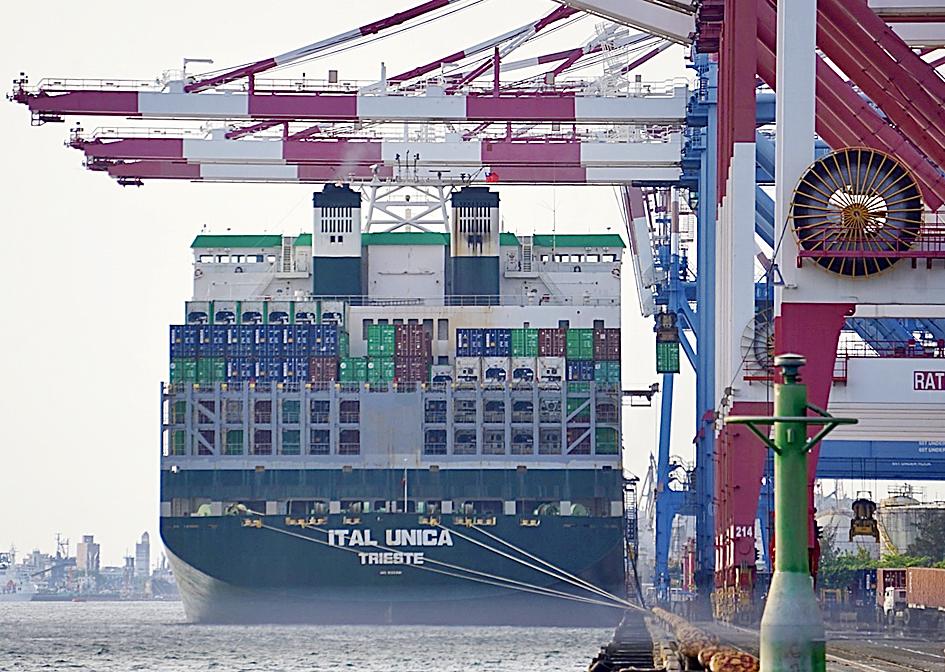Taiwan’s exports last month climbed 18.8 percent year-on-year to a third record high of US$41.46 billion, backed by high demand for electronics used in digital transformation and innovative technology applications, the Ministry of Finance said yesterday.
The demand could also see outbound shipments rise to a new high this month with growth of 12 to 16 percent, Department of Statistics Director-General Beatrice Tsai (蔡美娜) said, adding that exports in May usually fare stronger than in April.
“Global demand for chips has not shown any sign of cooling thus far, while selling prices for non-tech products stayed high, accounting for robust export showings,” Tsai told an online news conference in Taipei.

Photo: CNA
Shipments to major trade partners were overall higher, although they lost some momentum due to an economic slowdown in China because of the country’s strict COVID-19 prevention measures, she said.
Exports logged positive cyclical movements in the past 22 months and are moving steadily toward beating the 26-month expansionary cycle seen between November 2010 and December 2012, Tsai said.
Shipments of electronics, mainly semiconductors, spiked 27.5 percent to US$17.21 billion, driven by demand for chips used in smartphones, high-performance computers, laptops and vehicles, a ministry report said.
Exports of information and communication technology products put up a relatively lackluster 10.2 percent increase to US$5.19 billion, as US demand for servers remained sturdy, while demand was more subdued in China and ASEAN markets, Tsai said.
The slowdown could likely be attributed to lockdowns in major Chinese cities, and merits close monitoring, she said.
The retreat is most evident in exports of optical products, which declined 15.6 percent to US$918 million, she added.
Non-tech product categories turned out mostly healthy with year-on-year advances of 4 percent to 60 percent, partly because international fuel prices pushed up selling prices, Tsai said.
Plastic products were the only exception, with a 2.1 percent slip to US$2.37 billion, the report said.
Meanwhile, imports soared 26.7 percent to US$36.55 billion, as agricultural and industrial materials, capital equipment and consumer products posted double-percentage point improvements, the report said.
China’s lockdowns not only affected Taiwan’s exports, but also weighed on imports, Tsai said, as material and component shortages could worsen.
The latest trade data gave Taiwan a trade surplus of US$4.91 billion, shrinking 19 percent from a year earlier owing partly to a strong US dollar.
For the first four months of the year, exports gained 22.3 percent year-on-year to US$162.4 billion, while imports rose 26 percent to US$142 billion, the ministry said.

CHIP RACE: Three years of overbroad export controls drove foreign competitors to pursue their own AI chips, and ‘cost US taxpayers billions of dollars,’ Nvidia said China has figured out the US strategy for allowing it to buy Nvidia Corp’s H200s and is rejecting the artificial intelligence (AI) chip in favor of domestically developed semiconductors, White House AI adviser David Sacks said, citing news reports. US President Donald Trump on Monday said that he would allow shipments of Nvidia’s H200 chips to China, part of an administration effort backed by Sacks to challenge Chinese tech champions such as Huawei Technologies Co (華為) by bringing US competition to their home market. On Friday, Sacks signaled that he was uncertain about whether that approach would work. “They’re rejecting our chips,” Sacks

It is challenging to build infrastructure in much of Europe. Constrained budgets and polarized politics tend to undermine long-term projects, forcing officials to react to emergencies rather than plan for the future. Not in Austria. Today, the country is to officially open its Koralmbahn tunnel, the 5.9 billion euro (US$6.9 billion) centerpiece of a groundbreaking new railway that will eventually run from Poland’s Baltic coast to the Adriatic Sea, transforming travel within Austria and positioning the Alpine nation at the forefront of logistics in Europe. “It is Austria’s biggest socio-economic experiment in over a century,” said Eric Kirschner, an economist at Graz-based Joanneum

BUBBLE? Only a handful of companies are seeing rapid revenue growth and higher valuations, and it is not enough to call the AI trend a transformation, an analyst said Artificial intelligence (AI) is entering a more challenging phase next year as companies move beyond experimentation and begin demanding clear financial returns from a technology that has delivered big gains to only a small group of early adopters, PricewaterhouseCoopers (PwC) Taiwan said yesterday. Most organizations have been able to justify AI investments through cost recovery or modest efficiency gains, but few have achieved meaningful revenue growth or long-term competitive advantage, the consultancy said in its 2026 AI Business Predictions report. This growing performance gap is forcing executives to reconsider how AI is deployed across their organizations, it said. “Many companies

Taiwan’s long-term economic competitiveness will hinge not only on national champions like Taiwan Semiconductor Manufacturing Co. (TSMC, 台積電) but also on the widespread adoption of artificial intelligence (AI) and other emerging technologies, a US-based scholar has said. At a lecture in Taipei on Tuesday, Jeffrey Ding, assistant professor of political science at the George Washington University and author of "Technology and the Rise of Great Powers," argued that historical experience shows that general-purpose technologies (GPTs) — such as electricity, computers and now AI — shape long-term economic advantages through their diffusion across the broader economy. "What really matters is not who pioneers